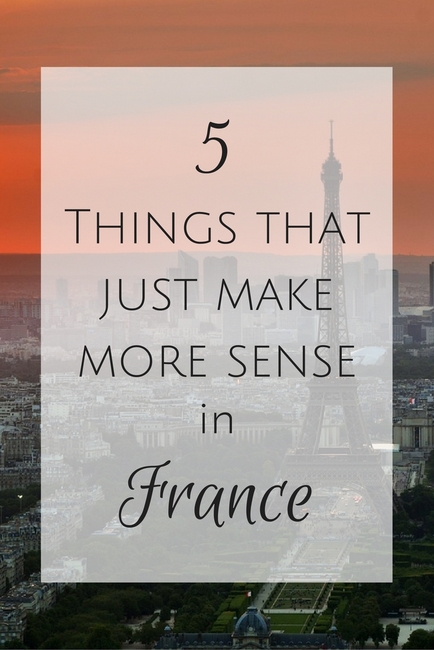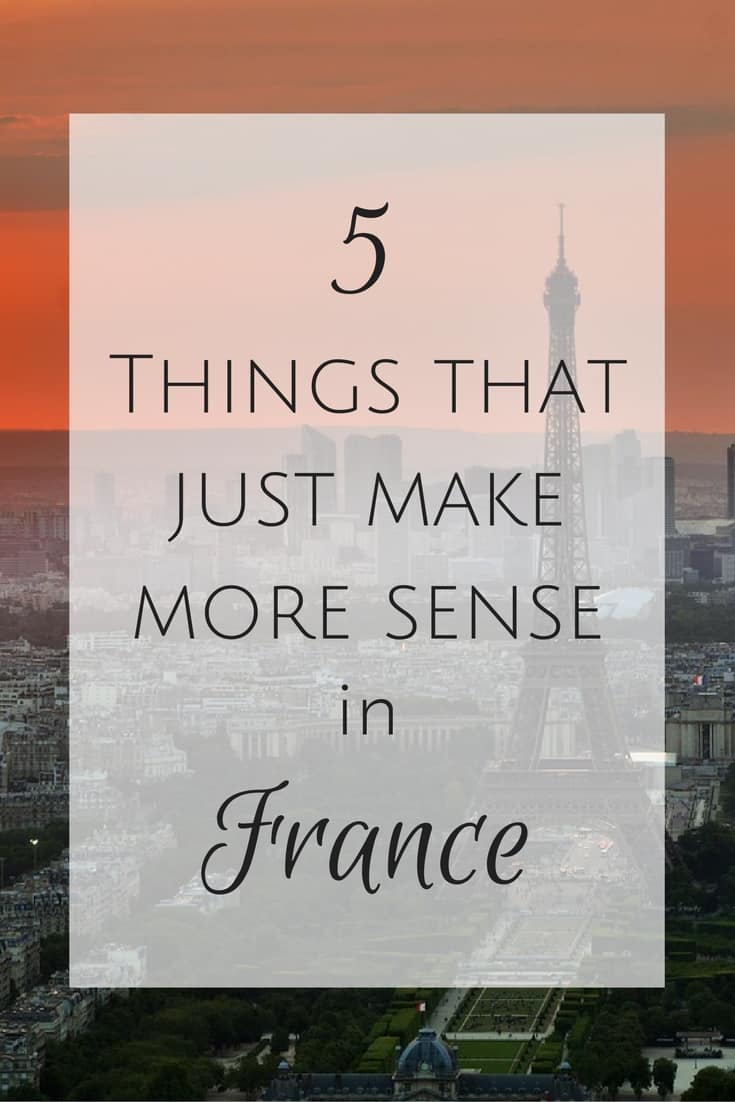I try to keep it real around here and am the first to tell you that the French language can be frustrating, that life in France is NOT like a vacation in France and all the other realities of being a foreigner abroad. But I’m also all about balance. The longer I live in France, the more I realize that a lot of things in France and French culture just make more sense here than they do in the US.
GO!
French culture: Things that make more sense in France
The metric system
Rounded numbers are nice. 1 kilometer = 1000 meters. 100 centimeters = 1 meter. The metric system just makes sense. Where the heck did 1 mile = 5280 feet come from? Imperial and US customary measurement systems just seem unnecessarily complicated. The more you use the metric system, the more you’ll realize how many positives it has going for it.
Let’s take baking, for example. Having exact measurements is a must unless you want a crappy cake. Measuring ingredients in grams is more precise and 100 grams is always 100 grams… but you know what isn’t exact? 1/2 cup. Your 1/2 cup of flour might be heavier than mine because of how you scoop it and that’s going to affect the cookies (rarely in a good way!).
No electoral college
Tom popped in a little while ago with what he finds strange about the US election process and at the top of the list for me as well is the electoral college. In France, the popular vote wins — every time. It’s a democratic process where the actual votes count and are what determines who will become president.
5 weeks of paid vacation
Why should we live to work? There are more important things. If you’re a full-time employee in France, the law says you get 5 weeks of paid vacation per year. You are also encouraged to use all 5 weeks. End of story.
Know what’s even better? All those public holidays. You get off for all of those too, and I’m not just talking about Christmas or New Year’s Day. In May 2017 alone, there are 3 that fall on a week day. Hello long weekend!
7 Things I’ll never understand about the French >>
Tax already included in price
I like when things are simple. When you’re shopping in France, the price on the label is the price you pay at the register. There’s no confusion when it comes to paying for things in France (and many places in Europe) because the tax is already factored into the price on the actual product or garment. That t-shirt is 25 euros and that’s exactly what you’ll pay at the register. Simple.
Health insurance isn’t tied to your employment
I wrote about health care in France here, but to sum it up, your health care coverage is not employer sponsored like it frequently is in the USA. If you lose or quit your job, you don’t lose your health coverage, nor are you forced to get the equivalent of an expensive COBRA plan.
Yes, there are pros and cons to every system on earth, but a country that takes care of its people’s health is a win in my book.
***
What about you? What things about French culture make more sense to you in France?
Pin it:







I would say that your healthcare is employer covered in so far as it’s the employer who pays your social charges and it’s the social charges that pay for health cover. This makes it nearly impossible for small businesses such as ours to employ additional staff as the social contributions are so high. I do agree that the system is much more efficient and probably still less expensive than the US system but it is punishing for small businesses. People in France who do not pay their own social charges have no idea how much it costs.
This is a great list.
I think it’s also logical that in France the SMIC, or minimum wage, is actually a livable wage. In the U.S. it isn’t.
Hm… “In France, the popular vote wins — every time”. Not so sure about this one! The president is elected after a 2 rounds votes’ system. After the first round, only the two first candidates win the right to stay for a second round. The winner at the second round is the president elect.
Last time Hollande lead the votes in both the first and second round. Marine Le Pen (far right party) was third after the first round. From what I hear, she has a high chance to be the front runner for the next presidential election.
Let’s say, she wins the majority of the votes at the end of the first round. Then loses to the challenger after the second run, because voters for other candidates of the first round, report their vote to the challenger. She’d lose the election.
So yes, the popular votes wins but just because we have two rounds. With only one, like in the US, she would win.
Now imagine what would have happened in the US with two rounds. Who would have gotten the votes from Gary Johnson and Jill Stein? Or if there were no primaries at all? A bunch of Republicans candidates, and two Democratic (O’Malley withdrew during the primary). An interesting question, isn’t it?
And Diane, just to make it more complicated, ask Tom about “la proportionnelle”!!
Yes, sorry for any confusion. I just meant there’s no electoral college. Tom explained the rounds in his post I linked. It would be crazy in the US without primaries! 😉
Here down under we get 4 weeks of paid vacation per year a heap of public holidays and if you work public holidays you get paid either double time or double & half time. Health insurance has nothing to do with your job either and we use the metric system also.
When I go back to England I notice the eery silence when I go into a shop. The automatic ‘Bonjour’ from customers and staff alike does make the world seem a friendlier place.
But as for the voting system – hasn’t the last year shown that the perfect democracy doesn’t exist as is a lot harder to create than it might seem?
In the Uk we pay national insurance, 11% of earnings towards healthcare and the state pension. The average cost of free at the point of delivery healthcare is £1,500 per person per year and 100% of the population are covered. In the USA healthcare cost over £5,000 per head per year and not everyone is covered. If I was in a bad car crash today my only worry would be getting better. I would be picked up and taken to hospital and would not pay a penny either now or later. Your system sucks and is unnecessarily expensive. You seriously let yourselves down over healthcare. Learn from Europe for your own sake. C’est pas difficile.
Hence the reason why I live in France…
Wow, at least one of the commenters before me got a little hostile! Every country has its pros and cons.
I don’t like being surprised by sales tax at the register, and I prefer the French system of tipping (…the customer isn’t responsible for paying the server a decent wage!) I also am surprisingly attached to Celsius, and it goes without saying that I love vacation. (But I can’t stand the constant pollution of second-hand smoke!)
For the record, I do have free health insurance in California as a full-time student! Health insurance is certainly an expensive mess over here, but some states do have options for those who can’t afford private coverage.
The Erasmus program that allows students to study in another country!
I always love your posts Diane and especially this one. I do agree with much of it. And being in the US I sometimes wish we had a universal system of measure , etc. I do agree with the sales tax included and restaurant tips included. As a self employed person I pay an insane amount for my health coverage and our system is such a mess right now. Not sure what the best way to go is but I do hope change will come in that regard. As for the electoral college, I must (respectfully) disagree. Regardless of where one is on the political fence, our forefathers were very forward thinking to implement such a system. It was established to provide a voice to states with less population. Most people who don’t like the electoral college really don’t understand how and why it works and why it was established. , I was one of them. It’s helpful to learn about it or even watch a YouTube video explaining it.